Low carb diet is a healthy way of keeping blood sugar levels in control. It boosts energy levels, reduces hunger and cravings for sugar, helps to reduce weight, reduces hypoglycemia and the risk of long-term complications and lowers down the cholesterol levels in the body.
A very low carb diet for people with type 1 diabetes includes 30 grams or less carbs per day which helps to effectively control their blood sugar levels.
There are different strategies for changing the diet and choosing the amount of carbs to be included in your diet. You should count your daily carb intake for a few days, then set a target.
Another strategy is to gradually reduce the carb intake and observe the change in the levels of your blood glucose. So you can replace a carb intake with a nutrient rich option which will reduce your carb intake.
6 Tips for following a low carb diet plan
These low carb diet tips are great for people diagnosed with diabetes. It helps them to cut down their carb intake.
- You should use a carb counter to monitor your daily carb intake.
- Non-Starchy vegetables are mandatory to be included in your diet.
- Have food items that have plenty of fiber as it is very important in a low carb diet.
- Avoid food that has high sugar content and fructose syrup. If you are someone who has a sweet tooth, then opt for sugar-free items.
- Never skip your breakfast! It is a very important meal of the day in a low-carb diet. You should eat at regular intervals throughout the day to maintain the blood glucose in the body. Try to have 3 meals and 2 snacks a day at proper intervals.
- All kinds of fats are not bad for your body. Natural fats like monounsaturated fats are good as they help to lower cholesterol levels.
Risks and considerations
It is very important to plan the meal when it comes to following a low carb diet because there are lots of specific nutrients which are not easily available. When you start following this diet you also need to consider certain risks that comes with it. They are:
- If you have some kind of kidney disease then eating large amounts of protein can speed up the process of damaging the kidneys.
- There are chances of osteoporosis and bone fracture.
- It can also reduce your fiber intake which is not a good thing.
- It can cause the arteries to clog.
- It can also make some people feel extra hungry, moody and face problems in concentrating.
These risks are mainly caused because of having too much of processed protein.
Food to eat
Add these low carb food options in your diet and you can consume them till you feel full. You should also include enough protein in your diet plan.
- Meat, Poultry and seafood
- Cheese and cream cheese
- Good fats like olives and avocados
- Nuts
- Tofu
- Non-starchy vegetables
- Olive oil, coconut oil, butter, cream, sour cream
Food to have in moderation
Smaller proportion of these food options is no harm.
- Berries (up to 1 cup)
- Cottage cheese (up to ½ cup)
- Plain Greek yogurt (up to 1 cup)
- Flaxseeds or Chia seeds (up to 2 tablespoons)
- Nuts and Peanuts (up to 1-2 ounces or 30-60 grams)
- Dark chocolate (up to 30 grams)
- Squash, pumpkin, acorn, spaghetti, hubbard, butternut (up to 1 cup)
- Liquor (up to 50 grams)
- Dry red or white wine (up to 120 grams)
Food to avoid
Say NO to these Food options:
- Processed foods which includes packed food and salty snacks
- Food having high content of sugar like cakes, pastries, cookies, soda, juices, candies, sweetened tea, ice creams
- Starches like bread and bagels
- Alcoholic beverages
- Starchy vegetables like potatoes, yams, sweet potatoes and taro
- Pasta, cereal, corn and other grains
- Legumes like lentils, peas, beans (you can have green beans and snow beans)
- Milk
- Fruits (you can have berries)
Diet plan
Carb intake depends on person to person and factors like height, weight, activity level and lifestyle. Some meal options includes:
Breakfast
- Few Hard-boiled eggs
- Avocados
- Low-sodium cottage cheese
- Smoothies made with berries, avocados and banana
- Low-fat yogurt
- Stir veggies prepared in virgin olive oil
Lunch and Dinner
- A portion of Cauliflower rice with veggies and tofu
- Salmon
- Grilled or baked chicken
- Salad with some nuts
- Zucchini noodles
- Bunless cheeseburgers
- Pizza made with cauliflower crust
- Stuffed chicken made up of veggies and cheese
- Whole-grain pasta cooked with veggies and fish
- Tuna and tuna steaks
- Stuffed spaghetti squash with veggies
- Eggplant lasagne
Snacks
- Veggies and Hummus
- Handful of Nuts
- A Fruit
- String cheese
- Few Olives
- A bar of Dark chocolates
- Kale chips
- Beef jerky
- Apples with peanut butter
- Sardines
- Steamed edamame





